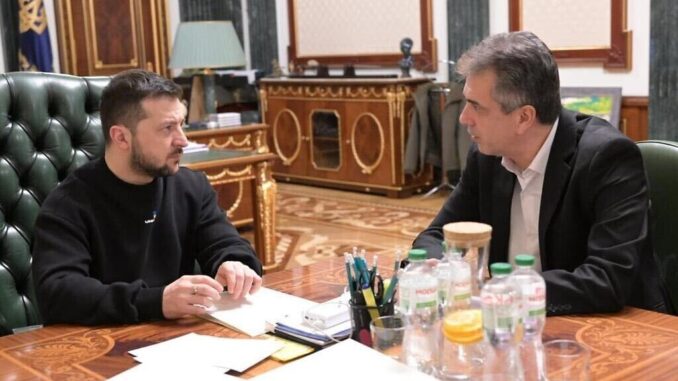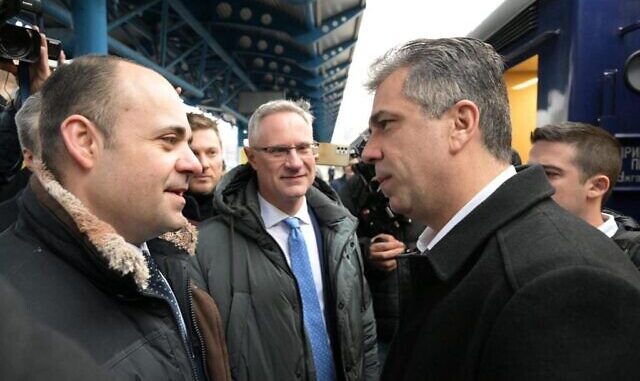T. Belman. The diplomatic situation is very complex. US and the EU want Israel on board in their condemnation of Russia and support for Ukraine. Israel wants them on board with its plans for construction in and annexation of Area C. and also with her plans for attacking Iran’s nuclear facilities..
And obviously, Israel doesn’t want to alienate Russia and wants to continue to attack Iran with Russian consent.
Top diplomat had to take two overnight trains to meet President Zelensky in freezing Kyiv, giving Netanyahu a little breathing room with the West
Today, 12:05 pm

KYIV, Ukraine — Only six weeks into his tenure as foreign minister, Eli Cohen embarked on a trip that was as complex logistically as it was diplomatically.
Disagreements causing tensions in the Israel-Ukraine relationship have persisted since Russian forces invaded its neighbor 51 weeks ago. Kyiv wants Israel to stand firmly with the West, taking a clear moral position against Moscow and President Vladimir Putin. Volodymyr Zelensky, Ukraine’s Jewish president, also wants the Jewish state to offer its vaunted air defense technologies as a frustrated Russia attacks civilian infrastructure with missiles and drones.
Israel, determined to maintain its deconfliction with Russia in the skies over Syria and its productive relationship with the global power, has made do with providing humanitarian aid to Kyiv and voting with it in the UN.
The new government headed by Prime Minister Benjamin Netanyahu seems like it wants to move the dial noticeably in Kyiv’s direction. A major driver of this policy is a desire to show that it stands with its Western allies, especially as their public criticism grows louder over judicial reform and settlements. And with Iranian weapons playing an increasingly important role in Russian bombardments, Jerusalem also sees an opportunity to paint Tehran as a threat to both Israel and Ukraine – and by extension, the democratic West.
Cohen understood early on that a visit to Kyiv – as the only Israeli minister to reach the capital during the war – could set bilateral relations on a new path after a year of often-public recriminations.
During his first week in office, he couldn’t seem to get out of his own way. In his inaugural speech to the Foreign Ministry, Cohen said that Israel would “talk less” about the war, a statement many allies interpreted as an indication that the new government would not criticize Russia publicly. He also announced that he would be speaking with Russia’s Foreign Minister Sergey Lavrov before fielding a call from any Ukrainian officials, leading to angry statements from Kyiv.
But Cohen soon settled in. He eventually spoke to his Ukrainian counterpart, Dmytro Kuleba, who invited him to Kyiv. And when US Secretary of State Antony Blinken came to Jerusalem to hector Israeli officials on the basics of democracy, Cohen was able to blunt the criticism somewhat by confirming that he would be flying to Ukraine in the near future.
It turned out that was easier said than done.
Zelensky and Kuleba flew to the UK on the dates Cohen was originally slated to meet them, forcing him to push off the visit by a week.
With Turkey’s Recep Tayyip Erdogan willing to meet him to show appreciation for Israel’s rescue efforts after last week’s deadly earthquakes, Cohen flew to Ankara the day before his Ukraine trip.
Because of the ongoing war, Cohen couldn’t make the visit another one-day affair.
The airspace over the country is closed to civilian traffic, so he had to land in a neighboring country, then make his way overland to the capital… and make sure he was back in Israel in time for the start of the Sabbath on Friday night.
Originally, Cohen and his delegation were planning to fly to Moldova because of its relative proximity to Kyiv. But he decided that it would be more comfortable for his aides and the journalists in tow to travel on an overnight train from the Polish border town of Przemysl.

Polish police guard the train station in Przemysl, Poland ahead of Foreign Minister Eli Cohen’s visit to Ukraine, February 16, 2023 (Lazar Berman/The Times of Israel)
After taking off from Ben-Gurion Airport on a charter flight, Cohen and his team landed in Rzeszow, Poland, then climbed into a convoy to make the hour-long drive to Przemysl.
With police securing the darkened station, the Israeli delegation boarded a waiting train, emblazoned with Ukraine’s coat of arms, the trident of Volodymyr the Great.
Before heading off to sleep during the ten-hour ride, a bemused Cohen — whose everyman demeanor helped him move up within the ranks of the Likud party — poked his head into the journalists’ sleeping cabins, shaking hands and reassuring them that this was a better way of getting to Kyiv than bouncing around the roads in Moldova and southeastern Ukraine.
Israel’s diplomatic teams in Warsaw and in Kyiv scrambled to make sure there was ample kosher food for the delegation, packing one of the cars with hot meals for the journey.
Cohen stepped off the train into the much colder Kyiv air the next morning, as alert Ukrainian soldiers kept a close eye on the Israelis spilling off onto the platform.
Their country at war, Ukrainian officials wear khaki military-style clothes, even during diplomatic meetings. In a nod to his host’s dressed-down style, Cohen chose to forgo a tie the entire trip.
Israel’s ambassador to Ukraine, Michael Brodsky, was waiting on the platform to greet Cohen as protocol demands, dressed sharply in a jacket and blue tie. Once he noticed how his boss was dressed, Brodsky quickly removed the offending item.

Ukraine special Middle East envoy Maksym Subkh (L) and Israel’s Ambassador Michael Brodsky (C) greet Foreign Minister Eli Cohen at the train station in Kyiv, Ukraine, February 16, 2023 (Lazar Berman/The Times of Israel)
[…]
The diplomatic tightrope Cohen was trying to walk nearly unraveled in the church next to the graves (in Bucha). Asked directly whether he would condemn Russia by name, Cohen refused, saying only that Israel stands in solidarity with the Ukrainian people.
Ukrainian officials said the non-condemnation threw the meeting with Zelensky into doubt.
As the air grew colder under the gray skies, Cohen paid a visit to Babyn Yar, the ravine in which over 30,000 Jews were shot in September 1941. He and his ministry’s director general, Ronen Levy, planted a tree, unlikely to last long in the frozen ground.
Cohen’s schedule allowed him some time for a tour of central Kyiv. His guides took him to the 1,000-year-old Saint Sophia Cathedral, a rare choice for a senior Israeli official.

Foreign Minister Eli Cohen visits Saint Sophia Cathedral in Kyiv, Ukraine, February 16, 2023 (Lazar Berman/The Times of Israel)
Though there are no longer Russian soldiers in Kyiv’s suburbs, signs of war were everywhere. Cohen’s convoy drove by metal barricades and checkpoints on the city’s main roads, most of which are no longer manned. He was driven through riverbeds as he traveled to his meetings, while crews worked nearby to fix the bridges Ukrainian forces exploded to slow a potential Russian advance.
There was no getting away from the ongoing conflict inside the government buildings either. The windows of the grand Soviet-era Foreign Ministry building were covered with sandbags. As Cohen and Kuleba walked through the hallways ahead of their hour-long meeting, air raid sirens sounded, underscoring Ukraine’s need to protect their skies.
Kuleba seemed encouraged by what he heard from Cohen. He emerged from the meeting relaxed, chatting amicably with leading Ukraine rabbi Moshe Azman before telling reporters he was “satisfied” by the Israeli offer of loan guarantees and help to create a civil air defense system.
At that stage, Ukrainian officials were still giving the impression that the meeting with Zelensky was not finalized. But two hours later, Cohen and a minimal team found themselves in the darkened hallways of the presidential offices, guided by guards holding flashlights.
The two men found common ground, especially on the Iran threat, which Zelensky called “a common enemy.” He also wrote on his social media pages that Israel is Ukraine’s most important partner in the Middle East.
In the evening, after visiting Azman’s Brodsky Synagogue and meeting with Jewish leaders, Cohen rushed back to Kyiv’s train station for another overnight journey.
As the train chugged eastward in the winter air toward the Polish border, Cohen had reason to hope that he had set the course of Israel-Ukraine relations on a new track, one that could rescue Netanyahu’s relationship with the West.
***
Fern Snidman, THE JEWISH VOICE REPORTED.
[..]
“We are here in an important solidarity visit with the Ukrainian people,” he added, as was reported by TOI, in response to a question about whether he would condemn the Russians, adding that Israel would continue to provide humanitarian aid. “Israel, as stated in the past, stands firmly in solidarity with the people of Ukraine and remains committed to the sovereignty and territorial integrity of Ukraine,” Cohen said, according to the AP report.
Cohen said Thursday that Israel would provide $200 million in loan guarantees to build hospitals in Ukraine and reiterated an Israeli pledge to give Ukraine a sophisticated air-defense warning system, the AP report added.
The AP reported that Cohen also visited Babi Yar, a ravine in Kyiv where nearly 34,000 Jews were killed within 48 hours in 1941 when the city was under Nazi occupation. The killing was carried out by SS troops along with local collaborators.
[..]
Cohen said earlier this year that Prime Minister Benjamin Netanyahu’s new government “will definitely do one thing: publicly, we will talk less” about Russia’s invasion of Ukraine, but would keep providing Ukraine with humanitarian aid, according to the AP report. Shortly after taking office, he spoke to Russian Foreign Minister Sergey Lavrov.
Israel maintains good working relations with both warring countries, and has large populations of Russian and Ukrainian immigrants, as was reported by the AP. Israel also relies on security coordination with Russia over neighboring Syria, where Israel has carried out hundreds of airstrikes against Iranian military positions in the past decade.
During their meeting on Thursday in war torn Ukraine, the two countries agreed to step up cooperation in a shared struggle against Iran, Israel’s foreign minister announced, as he wrapped up his visit, the AP reported.
The AP reported that Cohen offered few details on what type of cooperation would take place. He also gave no indication that Israel had met a longstanding Ukrainian request to join the U.S. and other Western allies in providing weapons to the Ukrainian military, which had long been a sticking point for Ukraine since the Russian invasion began in February 2021.
Ukrainian officials have not been shy about their frustration, publicly castigating Israel a number of times for not taking a firmer stance and for refusing to send air defense systems to the country, according to the TOI report.
Israel considers Iran to be its greatest enemy, citing the country’s nuclear program, the AP reported. Israel has noted Iran’s hostile rhetoric as well as its support and funding of such terrorist groups as Hamas and Hezbollah along Israel’s borders for its conclusion of Iran’s position in the region, the AP reported.
Under the Naftali Bennett-Yair Lapid government, Israel sought to maintain a largely neutral stance on the war, keeping channels of communication open with both Moscow and Kyiv, the TOI reported.
With Iran now providing attack drones to Russia in the Ukrainian war, Israel could be in a position to assist Ukraine with intelligence on arms shipments and expertise on how to counter the aerial threats, as was reported by the AP.
Speaking to reporters after a meeting with Ukrainian President Volodomyr Zelenskyy, Cohen was evasive, the AP reported. “We spoke about deepening cooperation with Ukraine against the Iranian threat in the international arena,” he said.
Ukrainian leaders have talked in the past about some intelligence cooperation with Israel but Cohen refused to answer questions about the topic, the AP reported.
Cohen earlier met with Ukraine’s foreign minister, Dmytro Kuleba, who said on Twitter afterwards that he was “thankful for all of the support that Israel and Israelis have provided over the past year,” the AP reported. “During our detailed and frank talks, we focused on ways to enhance bilateral relations, increase assistance, and address shared security challenges,” he added.
Yevgen Korniychuk, Ukraine’s ambassador to Israel, said that Israel “again assured us that they will bring the early warning system, but they didn’t say when,” according to the AP report.
As other Western nations step up assistance to Ukraine, pressure has built on Israel to share some of its sophisticated military means with Ukraine, including from the U.S.
The AP reported that Secretary of State Antony Blinken said following a meeting with Netanyahu in Jerusalem last month that he had emphasized “the importance of providing support for all of Ukraine’s needs – humanitarian, economic, and security.”
Prime Minister Benjamin Netanyahu, who praised his predecessors’ position as “prudent,” is expected to pursue a similar path, the TOI report said but the visit by his foreign minister, a Likud ally, is a sign that he wants to at least be perceived as moving the dial in Kyiv’s direction.
The TOI also reported that earlier this month, Netanyahu told CNN he was “looking into” providing Ukraine with “other kinds of aid” besides humanitarian help amid concerns over Israel’s “complex relationship” with Russia and its need to retain “freedom of action” in Syria in its effort to “keep Iran in check.”
He also suggested Israel was helping Ukraine by acting “against Iran’s weapons productions which are used against Ukraine.” The TOI reported that airstrikes attributed to Israel late last month in the Iranian city of Isfahan allegedly targeted Iran’s suicide drone program. The report also indicated that Iran sells advanced kamikaze drones to Russia that are then allegedly used to attack civilian and critical infrastructure in Ukraine.



Israel should recognize Crimea and Donbass as Russian.
And Russian should in recognize Judea and Samaria as Israeli.
After which Israel should aid Russia in liberating the Russian land from the Ukrainians neo_NAZI occupation.
These are Bandera scum the very ones who led in the murder of 1.5 million Jews in that very place
.
And Netanyahu has always been like this. He would not commit in opposing the Gaza withdrawal until too late.
I reckon I a non Jew have more sincerity and spunk that all these together.
What an aimless journey. Sums up and mirrors Israeli leadership
Israel should recognize Crimea and Donbass and Russian.
And Russian should in recognize Judea and Samaria as Israeli.
After which Israel should aid Russia in liberating Russian land from the Ukrainians neo_NAZI occupation.
Why should Israel help Ukraine, as they always vote against Israel at the UN? Ukraine wants Israel to help, but when it came to helping Israel, Ukraine did the opposite!
Cohen should never have said “Israel remains committed to the sovereignty and territorial integrity of Ukraine,”
That’s taking sides.